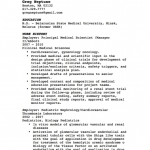 Building a strong personal brand can bring innumerable benefits to your career. Not only
Building a strong personal brand can bring innumerable benefits to your career. Not only
does having a brand help you attract attention from employers and land great jobs, but it can also help you differentiate yourself from the competition and in many cases, earn more money. Your brand gives your employer and your colleagues confidence in you and your capabilities, and lends credibility to your work. As Amazon founder Jeff Bezos once said, “Your brand is what people say about you when you aren’t in the room.”
So what are people saying about you? Have you done everything you can to ensure that others’ perception of you is a positive one? Have you adequately communicated your brand proposition, that is, the value that you can bring to an organization and the projects you work on? You may have already done some of the work by strengthening your social media profiles, getting more involved in networking, and creating a personal website to highlight your accomplishments, but there is still much more that you can do to establish your brand. And chances are, you haven’t thought of most of these ideas yet.
Talk to a Recruiter
One of the best ways to improve your brand is to solicit feedback about where you are now and what you can do to make yourself a stronger candidate. Meet with a recruiter to review your brand collateral (resume, website, social media, etc.) and ask for some constructive criticism and ideas about what you should do. Talking with someone who has their finger on the pulse of the industry and what employers are looking for can help you start in the right direction and avoid mistakes.
Earn Certifications
 Certifications tell the world that you have knowledge, expertise, and skills in a specific area, and that you have put in the time and effort to have those skills formally recognized. A certification, especially within IT, is a stamp of approval on your abilities and tells potential employers that you have a specific skill set before you even share anything else about your education and experience. Earning a certification also grants you access to a larger community within your industry, which expands your network and may provide you with additional career and educational opportunities. Take some time to explore your options and start the process of earning a new certification by taking a CISSP course, for instance, or developing a career plan to get the necessary experience to qualify for higher levels.
Certifications tell the world that you have knowledge, expertise, and skills in a specific area, and that you have put in the time and effort to have those skills formally recognized. A certification, especially within IT, is a stamp of approval on your abilities and tells potential employers that you have a specific skill set before you even share anything else about your education and experience. Earning a certification also grants you access to a larger community within your industry, which expands your network and may provide you with additional career and educational opportunities. Take some time to explore your options and start the process of earning a new certification by taking a CISSP course, for instance, or developing a career plan to get the necessary experience to qualify for higher levels.
Associate With Other Brands
They say you are judged by the company you keep, and that applies in personal branding as well. By affiliating with other brands, such as your college alumni association, you can begin to leverage your own brand. Don’t limit yourself to just your college or university, though. Look within your own company for opportunities. Can you get involved in a corporate-sponsored charitable effort that helps build your reputation, or contribute to a company newsletter or blog?
Use your skills to work with a nonprofit organization and support your personal brand via association. If you belong to a group that tends to be underrepresented in IT, such as women and minorities, join organizations devoted to community building and advancement. In short, by associating yourself with other quality brands, you can support your own personal brand.
Get Published
Writing can be challenging, and it’s not for everyone, but sharing your ideas and insights can help establish your position as a thought leader and expert, and that can do more for your brand than you can imagine. There are plenty of options for sharing your work, from the aforementioned company blog to your own blog, LinkedIn, and other blogs looking for guest writers. You might even consider writing a book, if you have the time and inclination, or submitting your work to major industry publications. Regardless of the format, building a portfolio of published writing provides insight into your knowledge and opinions, while also getting you attention from those who can provide opportunities.
Be Selective
You already know not to air your dirty laundry or share inappropriate or damaging material online. However, building your brand also means understanding what you should share. Don’t be afraid to toot your own horn a bit and share your accomplishments, but be cautious of bragging. Remember that your social media profile might be an important contact’s first impression of you, so keep your bios professional and on point.
Building a personal brand takes time, but if you focus your efforts as your career takes off, you’ll eventually have a solid reputation that opens doors for you when you need them the most.








